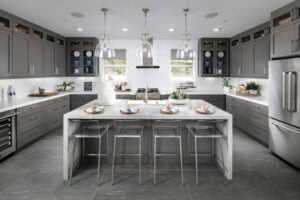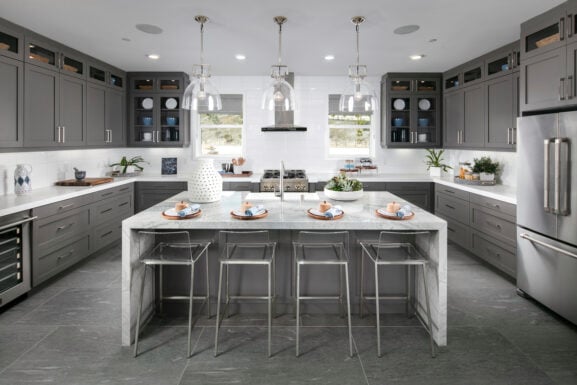Modern vs. Traditional Luxury Kitchen Remodeling in Ellenton: Which Style is Right for You?
- Luxury Kitchen Remodeling Anna Maria, Luxury Kitchen Remodeling Bradenton, Luxury Kitchen Remodeling Bradenton Beach, Luxury Kitchen Remodeling Cortez, Luxury Kitchen Remodeling Ellenton, Luxury Kitchen Remodeling Holmes Beach, Luxury Kitchen Remodeling Palmetto, Luxury Kitchen Remodeling Samoset, Luxury Kitchen Remodeling South Bradenton, Luxury Kitchen Remodeling West Bradenton, Luxury Kitchen Remodeling West Samoset
When embarking on a luxury kitchen remodel in Ellenton, one of the most significant decisions you’ll face is choosing between a modern or traditional design aesthetic. Each style offers unique characteristics that can transform your kitchen into a space that reflects your personality, lifestyle, and culinary needs. Here’s a detailed comparison to help you decide which style suits your vision for your dream kitchen.
Modern Kitchen Design
Key Characteristics
- Sleek and Minimalist: Modern kitchens are defined by clean lines, uncluttered spaces, and a focus on functionality. The design emphasizes simplicity and efficiency, often featuring glossy cabinets, stainless steel appliances, and surfaces like quartz or concrete countertops.
- Neutral Color Palette: The color scheme typically includes whites, grays, or black, with occasional pops of bold color used sparingly to create visual interest.
- Innovative Materials: Modern kitchens often incorporate post-industrial materials like metal, glass, and synthetic surfaces. These materials contribute to the streamlined, contemporary look.
- Open-Plan Layout: Modern kitchen designs prioritize open-plan living, seamlessly integrating with dining and living spaces to create an expansive, unobstructed view.
- Smart Technology: Integration of smart appliances and technology is a hallmark of modern kitchens, enhancing convenience and efficiency.
Advantages
- Functionality: Modern kitchens are designed for efficiency, with layouts that facilitate easy movement and access to appliances and storage.
- Aesthetic Appeal: The minimalist design creates a sophisticated, uncluttered look that can make smaller spaces feel larger.
- Customization: Modern kitchens allow for a high degree of personalization through the use of unique finishes, statement lighting, and innovative storage solutions.
Considerations
- Less Ornamentation: If you prefer a kitchen with intricate detailing or a more ornate look, modern design might feel too stark.
- Maintenance: Sleek surfaces and minimalistic designs can show fingerprints and smudges more easily, requiring more frequent cleaning.
Traditional Kitchen Design
Key Characteristics
- Warmth and Comfort: Traditional kitchens exude a sense of warmth, charm, and timeless elegance. They often feature natural materials like wood for cabinetry and classic stone countertops.
- Rich Color Schemes: The palette is typically soft and warm, with browns, creams, and muted tones dominating the space. Furniture-style cabinetry adds to the homey feel.
- Detailed Architecture: Crown molding, raised-panel cabinetry, and antique finishes on fixtures are common, creating a layered, inviting atmosphere.
- Classic Layouts: Traditional kitchens often have familiar layouts that prioritize comfort and functionality, with elements like kitchen islands and banquet seating.
- Ornate Lighting: Lighting fixtures are typically decorative, adding a touch of old-world charm.
Advantages
- Timeless Appeal: Traditional kitchens have a classic look that can endure trends, making them a safe choice for long-term satisfaction.
- Character and Charm: The use of natural materials and detailed craftsmanship adds character and a sense of history to the space.
- Versatility: Traditional kitchens can incorporate modern elements like statement lighting or unique backsplashes, blending the best of both worlds.
Considerations
- Space Limitations: Traditional kitchens might feel more enclosed due to the use of multiple cabinets and decorative elements, potentially limiting movement.
- Maintenance: Detailed woodwork and ornate finishes can require more maintenance to keep them looking pristine.
Choosing Between Modern and Traditional
Your choice between modern and traditional kitchen design should reflect your personal style, lifestyle, and the architectural context of your home:
- Personal Taste: If you prefer clean lines, simplicity, and a focus on technology, modern might be your choice. If you value warmth, detailed craftsmanship, and a classic aesthetic, traditional could be more appealing.
- Home Style: Consider the overall style of your home. A modern kitchen might look out of place in a historic home, while a traditional kitchen could feel incongruous in a contemporary setting.
- Functionality: Think about how you use your kitchen. Modern kitchens are designed for efficiency, while traditional kitchens might offer more storage and a cozy atmosphere.
- Resale Value: Both styles can add value to your home, but modern kitchens might appeal more to buyers looking for a turnkey, contemporary space.
Conclusion
Whether you choose a modern or traditional kitchen design for your Ellenton luxury remodel, the key is to create a space that not only looks beautiful but also functions seamlessly with your lifestyle. Modern kitchens offer sleek, efficient designs with smart technology, while traditional kitchens provide warmth, character, and timeless elegance. By understanding the characteristics, advantages, and considerations of each style, you can make an informed decision that will transform your kitchen into the heart of your home. Remember, the best kitchen design is one that reflects your personal style and meets your daily needs, ensuring a space that you’ll love for years to come.

Is a Bradenton Luxury Kitchen Remodel Worth It? Factors to Consider
Deciding if a luxury kitchen remodel in Bradenton is worth it hinges on your goals—financial return, lifestyle upgrade, or both. For a $50,000–$150,000 project in

Anna Maria Luxury Kitchen Color Schemes That Elevate Your Home’s Aesthetic
In 2025, luxury kitchen design in Anna Maria is all about creating spaces that are both functional and visually stunning. Color plays a pivotal role

Modern vs. Traditional Luxury Kitchen Remodeling in Ellenton: Which Style is Right for You?
When embarking on a luxury kitchen remodel in Ellenton, one of the most significant decisions you’ll face is choosing between a modern or traditional design

Transform Your Home in Cortez with a Luxury Kitchen Remodel: Before & After Inspirations
A luxury kitchen remodel in Cortez can transform your home, enhancing both its functionality and aesthetic appeal. Here are some inspiring before-and-after transformations that showcase

10 Must-Have Features for a High-End Luxury Kitchen Remodel in Holmes Beach
A high-end Holmes Beach luxury kitchen remodel isn’t just about aesthetics—it’s about blending cutting-edge functionality, timeless design, and standout features that elevate the space into

Samoset Luxury Kitchen Remodeling on a Budget: Where to Splurge & Where to Save
Remodeling a Samoset luxury kitchen on a budget is all about strategic spending—splurging where it counts for that high-end wow factor and saving on less

How to Plan a West Samoset Luxury Kitchen Remodel: Expert Tips & Trends
Planning a West Samoset luxury kitchen remodel is an exciting dive into design, functionality, and personal expression—but it’s also a complex project that demands strategy

Celebrity-Inspired Luxury Kitchen Designs in Palmetto You Can Recreate at Home
Celebrity-inspired Palmetto luxury kitchen designs offer a tantalizing blend of glamour, functionality, and personal flair—perfect for recreating that A-list vibe in your own home. Drawing

How to Make a Small Kitchen Look Luxurious: Bradenton Beach Design Secrets
Turning a Bradenton Beach small kitchen into a luxurious space is all about clever design—maximizing every inch while layering in high-end details. You don’t need

West Bradenton Luxury Kitchen Remodeling Mistakes to Avoid: Expert Insights
A luxury kitchen remodel in West Bradenton is a big investment—often $50,000 to $150,000 or more—so sidestepping common pitfalls is critical to nailing both aesthetics

French Country vs. Modern Luxe: Which South Bradenton Luxury Kitchen Style Fits Your Home?
Choosing between a French Country and Modern Luxe kitchen style for your South Bradenton luxury remodel comes down to your home’s vibe, your personal taste,

Eco-Friendly Luxury Kitchen Remodel in Bradenton: How to Combine Sustainability & Style
Creating an eco-friendly luxury kitchen remodel in Bradenton is all about blending sustainability with high-end style—think sleek designs that don’t compromise on elegance while minimizing

Top Luxury Kitchen Remodeling Trends for 2025 in Florida
As we approach 2025, Florida homeowners are embracing sophisticated kitchen renovations that combine cutting-edge technology with timeless elegance. The kitchen continues to evolve as the


